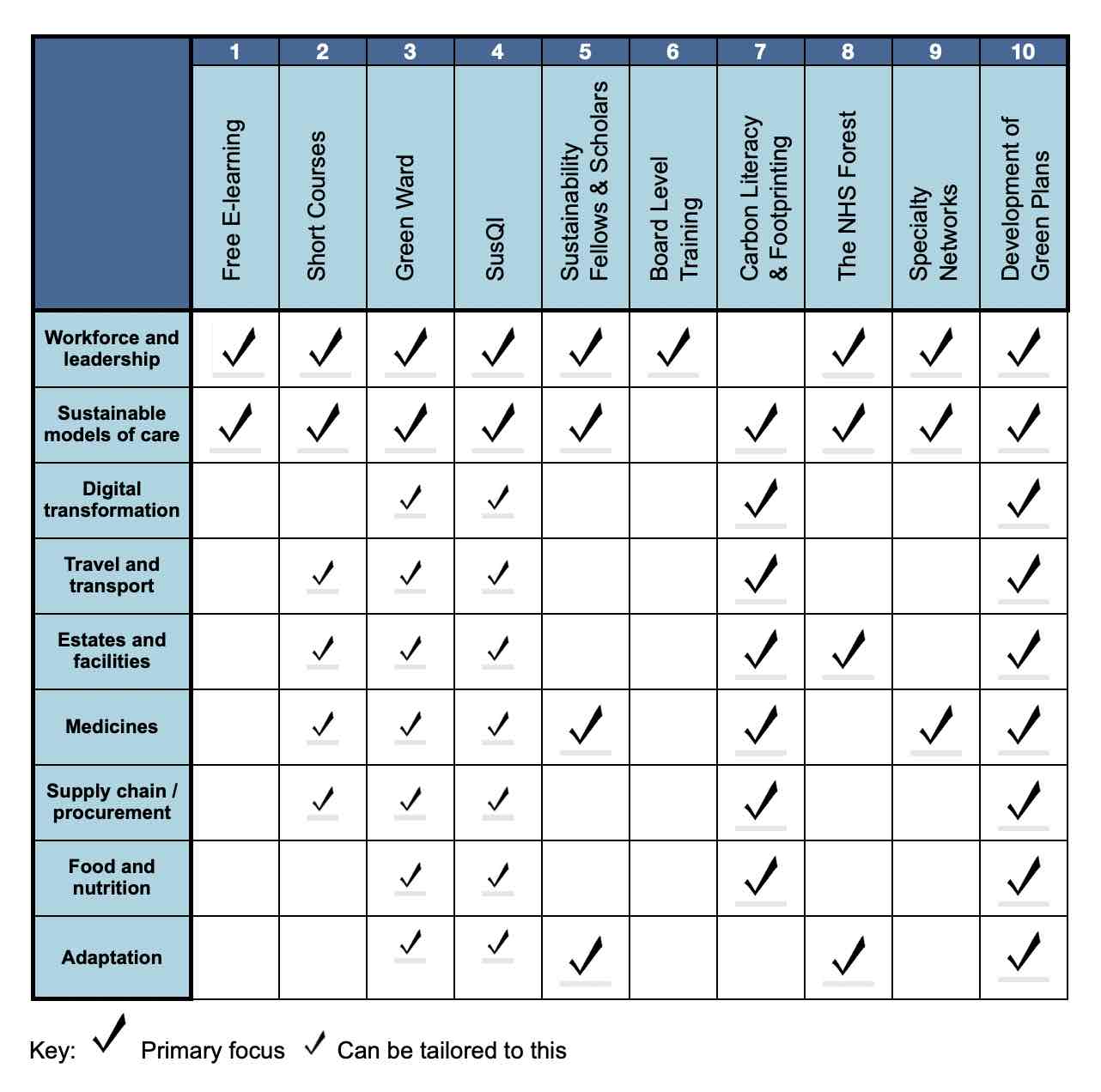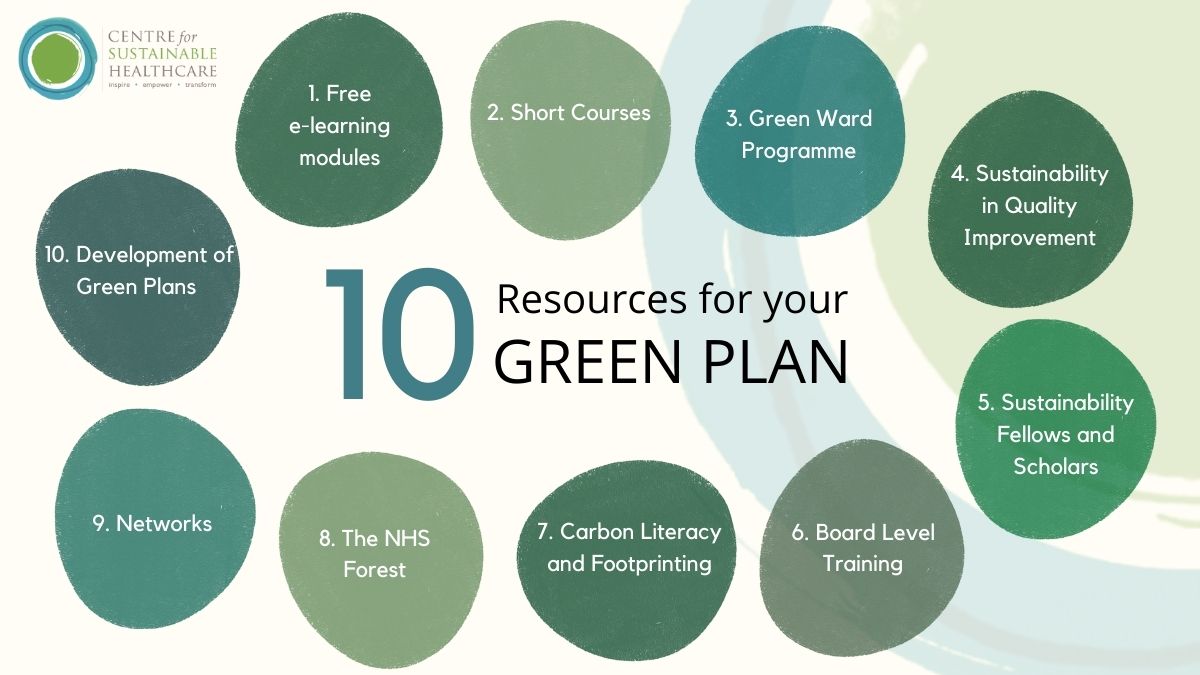Resources for Implementing your NHS Green Plan
NHS England's 2020 strategy "Delivering a Net Zero National Health Service" and the 2021/22 NHS Standard Contract set out the requirement for Trusts and Integrated Care Systems to develop a Green Plan. Since 2008, the Centre for Sustainable Healthcare has worked with healthcare providers to create a variety of resources, tools, networks and training programmes of use in implementing your Green Plan, measuring its impact using ’triple bottom line’ metrics (environmental, social and financial), and collaborating with external partners across the wider integrated care system.
For healthcare organisations in Wales, please view our Decarbonisation Action Plan resources here. For healthcare organisations in Scotland, please view our Sustainability Strategy resources here. Healthcare organisations outside of NHS England and NHS Wales looking to develop their sustainability plans may also find these resources useful. Please get in touch with us if you would like to more specific advice.
Overview of Green Plan sections and CSH resources

1. Free e-learning Modules for Workforce Training

CSH has partnered with elearning for healthcare to create free e-learning modules for all staff groups. Each module takes approximately 30 minutes to complete and includes downloadable certificates. The modules can be accessed here.
- Building a Net Zero NHS raises awareness about the demands and opportunities of a sustainable healthcare system. It presents a short animated film about a healthcare worker discovering the existing work on preventing climate change in the health system. It includes interactive activities on key information and case studies of successful projects.
- Sustainability in Quality Improvement empowers staff to integrate financial, social, and environmental measures into their QI projects.
- Sustainable Dentistry applies sustainability principles to the dental setting. Due August 2022.
2. Short CPD Courses for Workforce Training

A series of training courses offered by the Centre for Sustainable Healthcare provide the skills and motivation to initiate and deliver innovative low carbon healthcare. Designed for health staff at all levels they consist of:
- Four hours of engaging and interactive self-study materials
- A live online workshop with national experts to help participants apply theory to practice and design Green Plan projects
- A follow-up café session to share project findings and receive further advice
Block-booking rates and Trust, ICS or regional training packages are available. Learn more, here, and view our short courses, here.
“The courses provide a fantastic opportunity to network with other like-minded health care professionals”
“A knowledgeable faculty provide real-life examples of how sustainability projects can improve the NHS for patients and the environment”
3. Board-Level Workshop in Leadership for Sustainable Healthcare
For executive-level staff we offer two interactive 90-minute workshops. We outline the expectations of the NHS Net Zero Plan, highlight what is unique about leadership for sustainability and explore how to inspire people to lead and measure change. For more information, please email Stefi Barna.
4. Green Team Competition

This award-winning leadership and engagement programme mentors six teams from a Trust to identify carbon hotspots in their service and then develop, implement and evaluate a sustainable quality improvement project. A cash prize is awarded to the team whose project has the biggest positive impact or potential to do so and the highest quality projects are recommended for spread throughout the organisation.
In 2020, the Green Team Competition at Frimley NHS Foundation Trust was won by the paediatric respiratory team. Their project reduced the environmental impact of metered-dose (‘puffer’) inhalers used in the paediatric service. The forecast annual savings for all teams was £12,417 & 424.3 tonnes CO2e. The Recovery Team were the winners of the University Hospital Dorset Green Team Competition. They replaced single-use ethyl chloride spray for spinal/epidural block testing with a reusable metal ‘cold stick’. The forecast annual savings for all teams was £37,042 & 16,399kg CO2e respectively.
Benefits include:
- Training clinical staff in the skills required to run sustainable quality improvement projects and to teach others
- Engaging senior leadership in sustainable healthcare through inviting them to judge projects
- Forging good working relationships between all those required to deliver sustainable healthcare, especially helping sustainability managers work with clinicians and quality improvement teams – a real morale booster
For more information visit the Green Team Competition webpage, or email the Green Team Programme Manager, Rachel McLean at rachel.mclean@sustainablehealthcare.org.uk
5. Sustainability in Quality Improvement

The recent net zero targets for the NHS acknowledge that significant change needs to occur to make healthcare more sustainable. But how? The mechanism for change in the NHS is quality improvement (QI). Integrating sustainability into your QI framework will help to ensure that sustainability is included in every QI and transformation project carried out in your organisation. This will help to embed sustainability into operations and governance, create sustainable improvements and change culture.
The SusQI framework is an innovative approach to holistically improve healthcare by assessing quality through environmental, social and financial impacts – these three factors combine to form the ‘triple bottom line’. By applying CSH’s four principles of sustainable healthcare, health professionals can respond to both environmental challenges and social inequalities, while also saving money.
We have a range of SusQI support options for healthcare organisations, including:
- SusQI Academy
- SusQI Beacon Site Recognition
- Green Ward Competition
- 3-part SusQI course (block booking discounts are available)
- Project resources
To see examples of how the framework has been used in different organisations to achieve sustainable transformation; visit our Green Ward Competition and Green Surgery Challenge pages. Contact our programme lead, Catherine Richards, if you would like to discuss integrating sustainability into quality improvement in your organisation.
6. Sustainability Fellows and Scholars

CSH partners with NHS and medical specialties to train clinicians to move Green Plans forward strategically through full-time Fellow and part-time Scholar roles. Fellows and Scholars are mentored by CSH experts and supported by in-house resources including training courses, web-based networking tools, online case libraries, and the sustainability in quality improvement (SusQI) toolkit.
A CSH Sustainability Fellow is seconded or employed to work half- to full-time on sustainable healthcare for 1-3 years. Fellowships often include a research element supported by a university partner; they may focus on a clinical specialty or on a cross-cutting theme such as education, quality improvement or a specific topic (e.g. single-use plastics). A CSH Sustainability Scholar is allocated 1-2 days per week to work on a Green Plan related project over the course of a year and is based in a host organisation – often an NHS Trust.
Current examples include:
- National Fellow in Sustainable Anaesthesia, in partnership with Newcastle University Hospitals NHS Foundation Trust and the Association of Anaesthetists
- Welsh Clinical Leadership Fellow in partnership with Cardiff and Vale University Health Board
- Eye Scholar at Barts Health NHS Trust
Guidance on how to set up a fellowship or scholar position and how to gain funding can be accessed here.
7. Carbon Literacy and Footprinting

Identifying your carbon hotspot puts you in the best place to set your Green Plan priorities and to develop decarbonisation initiatives with the highest impact. CSH offers a variety of free carbon footprinting tools and resources and also a short course, Carbon Footprinting for Healthcare. In-house experts can help estimate and analyse your carbon footprint at organisation, department or clinical pathway level. Current examples include modelling the carbon footprint of dental procedures and analysing the triple bottom line of eye motility services at Moorfields Eye Hospital and its satellites.
For more information email Ingeborg Steinbach.
8. The NHS Forest

Your site can be literally greener - drawing holistically on the therapeutic potential of nature. NHS guidance tasks NHS trusts to prioritise interventions which simultaneously improve patient care and community wellbeing while tackling climate change and broader sustainability issues. Green space initiatives can do this.
The NHS Forest is a national alliance of over 200 UK health sites working to transform their green space and to realise its potential for health, wellbeing and biodiversity. This can mean beautiful gardens for rest and recovery; woodland, orchards and meadows that help to lock up carbon and growing space for fruit and vegetables to supply hospital kitchens. This good practice network captures learning from the best NHS green space initiatives – both at health sites and in the community – and works with individual health facilities on innovative projects.
We run an annual conference and awards scheme and provide help and guidance on all aspects of the use of green space in healthcare, from advice on tree planting to research evidence. Each year in the tree planting season we give away trees to NHS sites that can help plant the NHS Forest. To request trees contact info@nhsforest.org. You can register your site with the NHS Forest network. We also work in partnership with NHS organisations to employ Nature Recovery Rangers at health sites with a remit to engage patients, staff and local residents in activities that connect people to nature, support biodiversity and enhance green space for wellbeing. View our ranger video. If you are interested in partnering with us to host a ranger at your site, please contact info@nhsforest.org.uk for more information.
Our Green Space and Health course offers evidence, inspiration and support for health staff developing green space projects.
9. Peer Networks

Our specialty networks are set up around communities of practice, the evidence-based way to support change happening and spreading. All staff can join free and start straight away by asking questions and contributing ideas. With over 3,000 people now on 25 networks, clinical and non-clinical staff can facilitate resource sharing, discussion and peer support. Join a network here.
10. Embedding Green Plans
CSH can provide guidance for the development, revision and implementation of your organisation’s Green Plan. We will help you create a vision, approach and initiatives to reduce your carbon emissions while improving patient care. Your plan will address your local priorities while following the national trajectory to net zero by 2045.
For more information, please email Ingeborg Steinbach.

What is a NHS Green Plan?
NHS England has established a target of becoming net zero by 2040, with the goal of achieving an 80% reduction by 2028–2032. In October 2020, NHS England published its new strategy - Delivering a Net Zero National Health Service. To support delivery of this national strategy at local level, the 2021/22 NHS Standard Contract set out the requirement for Trusts and Integrated Care Systems to develop a Green Plan. The plan should detail the approach and practical steps they will take over a 3 year cycle towards reducing their emissions in line with the national trajectories. Outcomes from the Green Plans will:
- Ensure every NHS organisation is supporting the NHS-wide ambition to become the world’s first healthcare system to reach net zero carbon emissions
- Prioritise interventions which simultaneously improve patient care and community wellbeing while tackling climate change and broader sustainability issues
- Support organisations to plan and make prudent capital investments while increasing efficiencies
Trusts submitted their Green Plans in January 2022 and Integrated Care Systems in March 2022.

